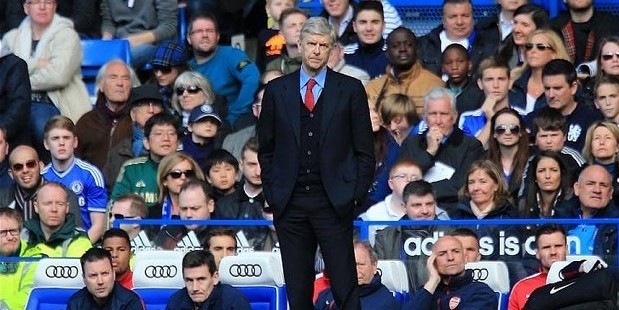Arsene Wenger waded waist-deep into a rather murky pool when he apparently declared at a press conference that Manchester City should be excluded from the Champions League for contravening the UEFA FFP regulations.
The Telegraph quote the Arsenal manager as saying that “You would think you accept the rules and you’re in the competition or you don’t accept the rules and you’re not in the competition – then everybody would understand it,” the Arsenal manager said.
He added that “There are rules. You respect them or you don’t respect them. If you don’t respect them you have to be punished. When Uefa doesn’t want to kick the clubs out of the Champions League they have to find a more subtle punishment. To me, and from all of us on the outside, it looks a complicated punishment.” It’s unclear which constituency the Frenchman was referring to when said that “…from all of us on the outside, it looks a complicated punishment.” One is left to wonder how many people’s opinions he canvassed before electing himself to speak on behalf on “all us on the outside.” I would suspect not that many, but maybe his conviction ran away with his logic a little.
Wenger called on UEFA to simplify the whole process with any breach of the regulations leading to elimination. He did however offer a grudging nod to the reasons why the governing body has adopted the approach it has with regard to punishing offending clubs. “For the punishment I think it’s a sophisticated punishment. I would like a more simple one that makes more sense but they have studied that for a very long time certainly to be in accordance with the legal side of it.” He declared.
City are one of nine clubs to face sanctions for contravening the FFP strictures and are currently faced with a £50 million fine, on top a reduction in the size of their squad for next season’s Champions League from 25 to 21 players. Of these, eight“must be locally trained and four club-trained.” City are however disputing the equity of the punishment and may well take legal action to dispute it. Such action would clearly fire up Wenger’s ire even further.
“I’m a complete supporter of Financial Fair Play because I think that every business should live within its own resources like in any other activity,” the Arsenal manager said. It’s an interesting point, and perhaps a particularly subjective one. Many businesses outside of football invite investment from outside of their own resources. To advocate any different is a merely partial view of the world at best.
Probably receiving the reply he required, one journalist asked the Frenchman what he thought of the prospect of City being Premier League champions whilst at the same time being in breach of UEFA regulations. Suitably primed, Wenger replied that: “Of course there is something wrong but I plead for that for years. There’s two ways of thinking about the whole process. You can say, ‘We don’t care, we want the billionaires to buy the big players, they spend what they want’, or you say, ‘We want to keep things fair’. Basically if you say to me tomorrow we give everybody £100 million in the 20 Premier League clubs, I say, ‘OK, I’ll take the gamble’. That is a fair competition. The unfair thing is the inflation can be too big and it can put too much pressure on the clubs who do not have these resources to overpay their players.”
The problem with that approach is of course that it is anything but fair. The playing field can never be ‘level’ in football or any other type of business. If you were starting a league from scratch, you could organise it in such a way that all resources are shared equally, or that the weakest clubs get first option on new talent. It’s a policy operated by the NFL in America for example. Although such a “to each according to his needs” approach does have more than a little ‘Marxist’ flavour to it in that most anti-communist of countries. That to one side however, the Premier League does not operate that way, and there will always be inequities.
Ultimately, the whole FFP structure may well be doomed to failure. The ethos of trying to keep things ‘fair’ in a situation that lacks such a quality in the first place is surely a fool’s errand. The real effect of FFP would not be to keep things ‘fair’ but rather to preserve the status quo. The rich clubs will stay that way and the poorer ones likewise. The problem is though that the theory sounds good. On an uneven playing surface however, slanted views are always going to be the order of the day.
For more from All Blue Daze:
Facebook: facebook.com/All BlueDaze
Twiter: @All_Blue_Daze
Add Sportslens to your Google News Feed!

